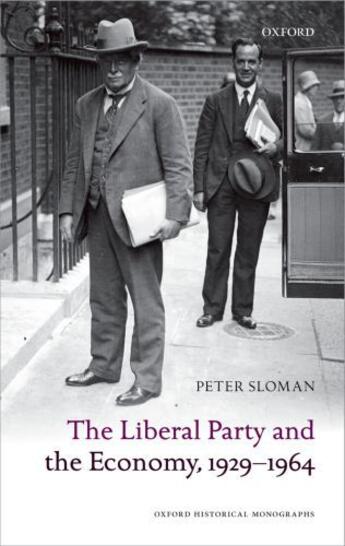Des idées de lecture pour ce début d'année !
Passionné(e) de lecture ? Inscrivez-vous
gratuitement ou connectez-vous pour rejoindre la
communauté et bénéficier de toutes les fonctionnalités du site !

The Liberal Party and the Economy, 1929-1964 explores the reception, generation, and use of economic ideas in the British Liberal Party between its electoral decline in the 1920s and 1930s, and its post-war revival under Jo Grimond. Drawing on archival sources, party publications, and the press, this volume analyses the diverse intellectual influences which shaped British Liberals' economic thought up to the mid-twentieth century, and highlights the ways in which the party sought to reconcile its progressive identity with its longstanding commitment to free trade and competitive markets.
Peter Sloman shows that Liberals' enthusiasm for public works and Keynesian economic management - which David Lloyd George launched onto the political agenda at the 1929 general election - was only intermittently matched by support for more detailed forms of state intervention and planning. Likewise, the party's support for redistributive taxation and social welfare provision was frequently qualified by the insistence that the ultimate Liberal aim was not the expansion of the functions of the state but the pursuit of 'ownership for all'. Liberal policy was thus shaped not only by the ideas of reformist intellectuals such as John Maynard Keynes and William Beveridge, but also by the libertarian and distributist concerns of Liberal activists and by interactions with the early neoliberal movement. This study concludes that it was ideological and generational changes in the early 1960s that cut the party's links with the New Right, opened up common ground with revisionist social democrats, and re-established its progressive credentials.
Il n'y a pas encore de discussion sur ce livre
Soyez le premier à en lancer une !

Des idées de lecture pour ce début d'année !

Si certaines sont impressionnantes et effrayantes, d'autres sont drôles et rassurantes !

A gagner : la BD jeunesse adaptée du classique de Mary Shelley !

Caraïbes, 1492. "Ce sont ceux qui ont posé le pied sur ces terres qui ont amené la barbarie, la torture, la cruauté, la destruction des lieux, la mort..."